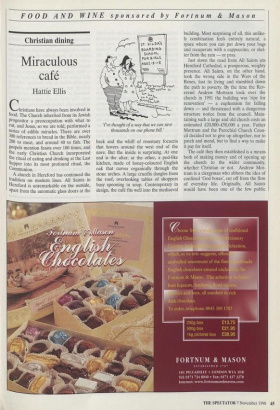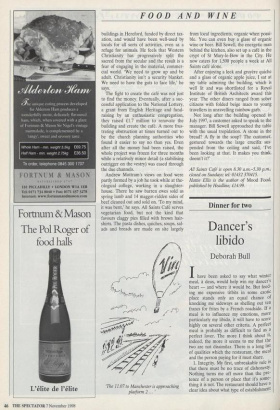FOOD AND WINE sponsored by Fortnum & Mason Christian dining
Miraculous café
Hattie Ellis
Christians have always been involved in food. The Church inherited from its Jewish progenitor a preoccupation with what to eat, and Jesus, so we are told, performed a series of edible miracles. There are over 300 references to bread in the Bible, nearly 200 to meat, and around 40 to fish. The gospels mention feasts over 100 times, and the early Christian Church incorporated the ritual of eating and drinking at the Last Supper into its most profound ritual, the Communion.
A church in Hereford has continued the tradition on modern lines. All Saints in Hereford is unremarkable on the outside, apart from the automatic glass doors at the 'I've thought of a way that we can save thousands on our phone bill.'
back and the whiff of rosemary focaccia that hovers around the west end of the nave. But the inside is surprising. At one end is the altar; at the other, a pod-like kitchen, made of honey-coloured English oak that curves organically through the stone arches. A large crucifix dangles from the roof, overlooking tables of shoppers busy spooning in soup. Contemporary in design, the café fits well into the mediaeval building. Most surprising of all, this unlike- ly combination feels entirely natural, a space where you can put down your bags and recuperate with a cappuccino, or shel- ter from the rain — or pray.
Just down the road from All Saints sits Hereford Cathedral, a prosperous, weighty presence. All Saints, on the other hand, took the wrong side in the Wars of the Roses, lost its living and stumbled down the path to poverty. By the time the Rev- erend Andrew Mottram took over the church in 1991 the building was 'ripe for renovation' — a euphemism for falling down — and threatened with a dangerous structure notice from the council. Main- taining such a large and old church costs an estimated E20,000-£50,000 a year. Father Mottram and the Parochial Church Coun- cil decided not to give up altogether, nor to patch and mend, but to find a way to make it pay for itself.
The café they then established is a means both of making money and of opening up the church to the wider community, whether Christian or not. Andrew Mot- tram is a clergyman who abhors the idea of confined 'God boxes', cut off from the flow of everyday life. Originally, All Saints would have been one of the few public
FOOD AND WINE
buildings in Hereford, funded by direct tax- ation, and would have been well-used by locals for all sorts of activities, even as a refuge for animals. He feels that Western Christianity has progressively split the sacred from the secular and the result is a fear of engaging in the material, commer- cial world. 'We need to grow up and be adult. Christianity isn't a security blanket. We need to have the guts to face life,' he says.
The fight to create the café was not just to find the money. Eventually, after a suc- cessful application to the National Lottery, a grant from English Heritage and fund- raising by an enthusiastic congregation, they raised £1.7 million to renovate the building and create the café. A more frus- trating obstruction at times turned out to be the church planning authorities who found it easier to say no than yes. Even after all the money had been raised, the whole project was frozen for three months while a relatively minor detail (a stabilising outrigger on the vestry) was eased through the due channels.
Andrew Mottram's views on food were partly formed by a job he took while at the- ological college, working in a slaughter- house. There he saw barren ewes sold as spring lamb and 14 maggot-ridden sides of beef cleaned out and sold on. 'To my mind, it was bent,' he says. All Saints Café serves vegetarian food, but not the kind that favours claggy pies filled with brown hair- shirts. The pasta dishes, quiches, soups, sal- ads and breads are made on site largely 'The 11.07 to Manchester is approaching platform 2 . . . ' from local ingredients, organic when possi- ble. You can even buy a glass of organic wine or beer. Bill Sewell, the energetic man behind the kitchen, also set up a café in the crypt of St Mary-le-Bow in the City. He now caters for 1,500 people a week at All Saints café alone.
After enjoying a leek and gruyere quiche and a glass of organic apple juice, I sat at my table admiring the building, which is well lit and was shortlisted for a Royal Institute of British Architects award this year. The other diners ranged from sober citizens with folded beige macs to young travellers in unravelling rainbow garb.
Not long after the building opened in July 1997, a customer asked to speak to the manager. Bill Sewell approached the table with the usual trepidation. A stone in the bread? A fly in the soup? The customer, gestured towards the large crucifix sus- pended from the ceiling and said, 'I've been looking at that. It makes you think, doesn't it?'
All Saints Cafe is open 8.30 a.m.-5.30 p.m., closed on Sundays; tel: 01432 370415. Hattie Ellis is the author of Mood Food, published by Headline, £14.99.



















































































 Previous page
Previous page